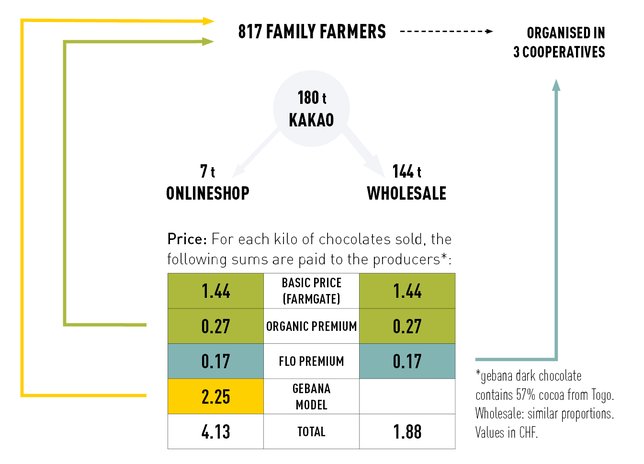Part 2: The rocky road to fair chocolate
Cocoa is too cheap for family farmers with limited land and low yields. We have a plan to change that.

To get to family farmers in Togo, it is sometimes necessary to travel along impassable roads and over makeshift bridges like the one pictured here.
70 per cent of the world's cocoa comes from West Africa. The majority of this cocoa is produced by millions of family farmers with small plots of land and low yields. For example, the cocoa producers we work with in Togo cultivate around 1.5 hectares of land with yields of just under 400 kilos per hectare. Given these conditions, it is impossible to earn a living wage at the current price of cocoa – even fair trade prices.
For this reason, organisations like Fairtrade International and Max Havelaar Switzerland recently introduced the Fairtrade Living Income Reference Price, which is a price that would allow these family farmers to earn enough to live on.
But even if the market were to adhere to this price, it still wouldn't be enough. This is because the reference price is based on about four hectares of farmland per family and yields of up to 800 kilos per hectare. These figures are not realistic – not for our partners in Togo and probably not for most family farmers in West Africa.
According to our own calculations, the cocoa price would need to be about double the current market price to make a meaningful difference to the lives of family farmers. The problem is that no one would by such expensive cocoa wholesale.
We're paying the right price, but...
In 2021, we applied our gebana model to the family farmers who supply us with cocoa. This means that in addition to the organic and fair trade prices, they also receive 10 per cent of our chocolate sales. Essentially, we end up paying them twice the market price. In theory.
Why in theory? Every year we purchase several hundred tonnes of cocoa from over 500 organic-certified family farmers in Togo. But only a fraction of this cocoa is processed into chocolate, which we then sell through our online shop. We sell the remaining cocoa wholesale. Despite this, we pay out the revenue share to all families and not just a select few. So in 2021, each family only received about 40 Swiss francs. To put this into perspective, the national minimum wage in Togo is currently around 56 francs per month. So our gebana model is little more than a drop in the ocean in Togo.

We are reliant on wholesalers
For our gebana model to really make a difference in Togo, we need to sell a lot more chocolate. In other words, we need to get wholesalers on board. So we called on our wholesale customers in January and explained to them that our organic and fair trade prices do not provide a living wage. Not for Togolese family farmers with their 1.5 hectares of land and 400 kilos of yield per hectare. And this is why we asked these customers to pay higher prices in increments. Every cent of this increase is passed on to the family farmers, in full.
Together we want to raise awareness of the issues in the cocoa trade and achieve a price that allows farmers to earn a living wage, even those with small plots of land and low yields. And if we manage to get other market players to join in our efforts, it would be a groundbreaking achievement. One that would change the lives of hundreds of family farmers and may one day serve as a benchmark.

 Login
Login

